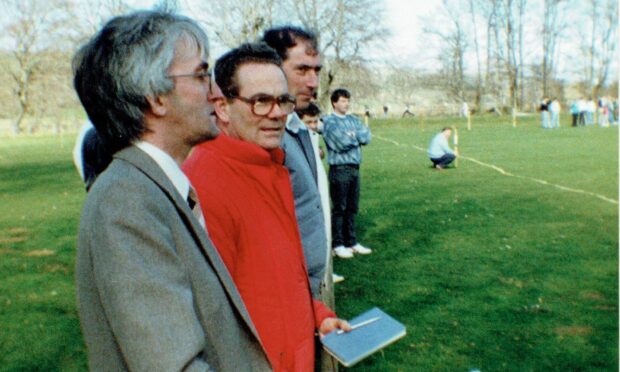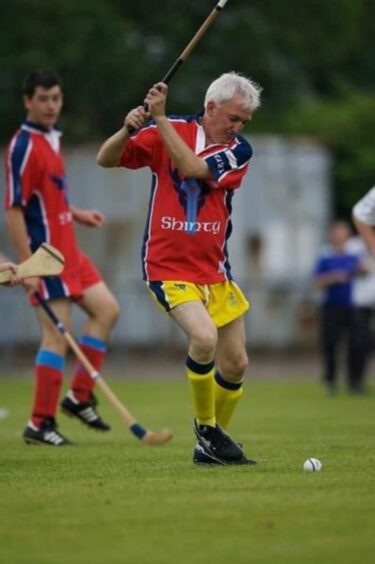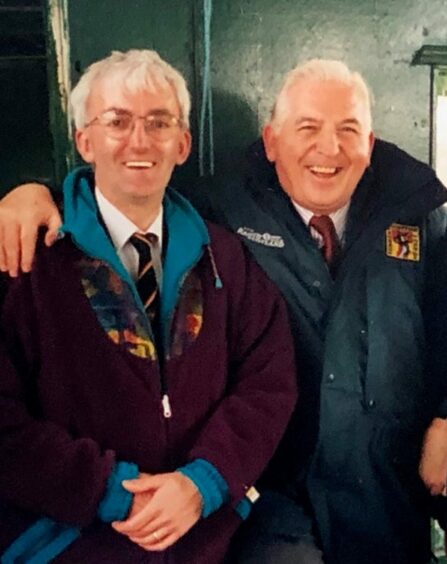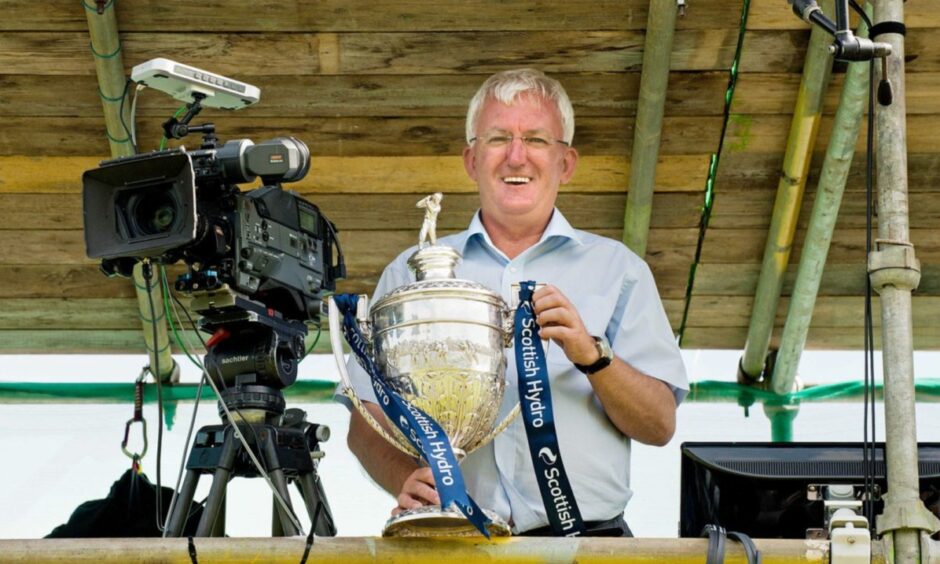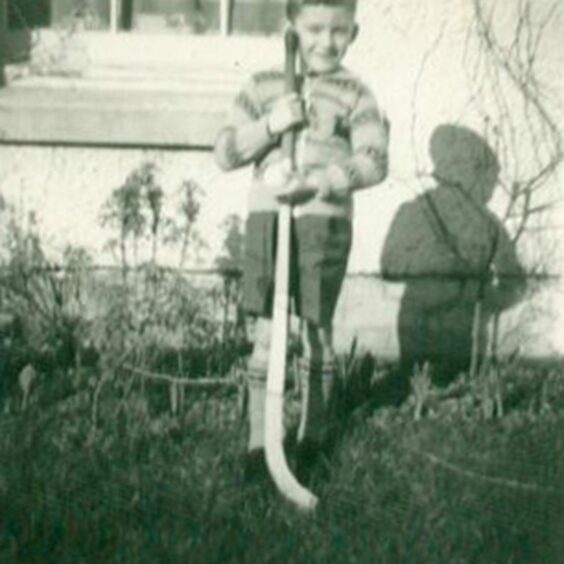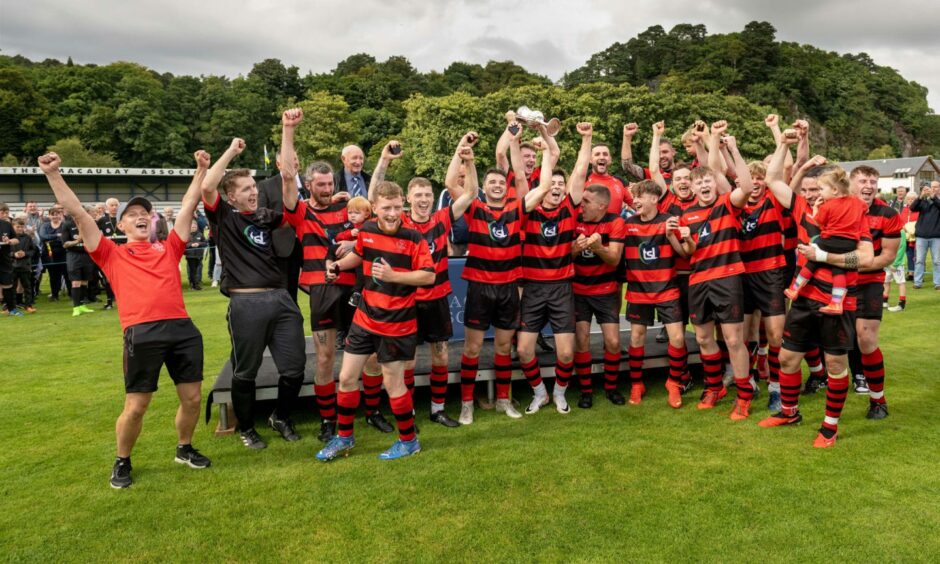It will be the end of an era when the final whistle blows in Saturday’s Tulloch Homes Camanachd Cup final between holders Kingussie and opponents Oban Camanachd.
It will be the last shinty match played at the Bught Park in Inverness before it is transformed over a two-year period into a revamped venue including a new shinty exhibition space.
As the bubbly fizzes and the winners pose for photos to treasure for years to come, legendary BBC broadcaster Hugh Dan MacLennan, “the voice of shinty” will say his closing words as a commentator on the sport.
Fittingly, his very first stint for the BBC at a Camanachd Cup final came 40 years ago when he was pitched into action alongside the late, great David Francey.
‘Working with a doyen of radio’
Hailing from Caol, the match was in well-known territory for Hugh Dan at nearby Claggan Park in Fort William as favourites Kyles Athletic needed to work hard for a 3-2 win against Strachur.
Hugh Dan recalled: “It was the first open draw, which was to allow for the best two teams getting through to the final.
“Before then, it was always structured in a way that a north team would meet a south team.
“Funnily enough, two south teams made it to the final. Strachur were very much the underdogs. Newtonmore and Kingussie had gone out of the competition, so it was interesting.
“Claggan Park was a newish venue at that time. My first experience in a Camanachd Cup final was that I had been a linesman on that pitch in 1973. I was still at school at that point.
“It was one of the wettest finals ever as Glasgow Mid Argyll defeated Kingussie.
“But in 1983, it was a huge challenge for me as it was my first one and I was working with David Francey.
“It was a huge experience for someone who had just walked in the door at the BBC, to work with one of the doyens of radio at that time
‘The master and his apprentice’
“The week before, David took me to Wembley. I was on a training course in London and he took me to see England play Scotland (at football).
“This was to familiarise ourselves with one another, but also so he could show me how he worked. Every commentator has a different way of doing things.
“He said to me ‘when I touch your elbow, sonny, you talk’. It was very much the master and his apprentice.
“David had never seen a shinty match in his life. I had to guide him through. Whoever hit the ball, I put the pen on his name (on the team sheet). Yet, it was like he’d done it all his life. He was masterly at what he did.
“He was nice enough in his autobiography to thank me for having got him through it.”
Two key moments led to long career
Former Gaelic teacher Hugh Dan, whose wide-ranging work also includes seven years as communications and marketing manager for ferry operator Caledonian MacBrayne, will still meet imminent commitments to cover the Fosroc Super Series rugby matches for the SRU and BBC ALBA, but he insists he is otherwise retired.
The fascinating 67-year-old explained a sporting commentating career spanning four decades was far from being the plan.
He said: “In 1983, I could not have envisaged it developing as it did. It was meant to be a one-off.
“The two key turning points were (the “voice of shinty” broadcaster in the 1980s and 90s) John Willie Campbell retiring and when BBC Alba, the Gaelic channel, arrived in 2008. That took it from one game a year to eight or nine games a year, which made it a different ball game.
“The 1983 final itself had a dramatic finish to the game. Kyles were great cup finalists and Strachur were not expected to win.
“There was an 18-year-old from Strachur called Ewan Paterson, who won the man-of-the-match medal.
“He emigrated to Australia the week after that final. He never played shinty again. It was a wonderful send-off.”
Broadcasting changes explained
Hugh Dan is secretary of Shinty Memories, the project which uses the sport to bring more senior members of the community together to reflect on the memorable moments, in the same way Football Memories does.
He gives a snapshot into how working within broadcasting is night and day compared to when he began.
He said: “Broadcasting has changed immeasurably. It is completely different. Technically, the equipment is so different. The constant live stuff, doing interviews in the morning, previews.
“The whole pattern of how broadcasting deals with major sporting events has changed totally, even more so in television. There are less personnel around because there is less equipment. There is less lighting and cabling too, for example.
“We still need satellite links. It’s highly complex and very expensive. People will always say there should be more sport on the telly and I agree, but you need the trucks, riggers, scaffolding, never mind the cameras and the personnel. You’re talking about four to eight cameras each time. It used to be one camera.
“If you compare what I did in 1983 to what I do in 2023, it’s chalk and cheese. That said, the shinty match remains the focal point.”
Summer switch was correct call
Shinty switched from being a winter sport in 2005 and Hugh Dan was at the heart of that key change, which has been largely hailed as a winning move.
He added: “The game itself has now changed – it’s a summer game. I was a director of the Camanachd Association when it fell to me to propose the motion at the extraordinary meeting to change shinty from winter to summer seasons. I could have gone down in history as the person who failed it.
“However, we had done our homework, and the clubs recognised the need to change. Playing in the summer has been a good move, although it is by no means perfect.”
Kingussie will be plotting revenge
Last month, Oban Camanachd beat Kingussie 2-1 in the final of the Macaulay Cup.
Although they are both Premiership clubs, this was an upset. It was the first time Oban had won that trophy since 1995.
So, could Oban win the Camanachd Cup this weekend? Hugh Dan believes last month’s result is sure to have a bearing.
He said: “Oban beating Kingussie in the Macaulay Cup final poses a few questions for Kingussie.
“I know they were disappointed. They fell apart to concede two goals in six minutes. They lost their shape and couldn’t cope.
“That is unusual for Kingussie in a cup final. They lost half a team to injury and various other things.
“Kingussie need to have all their best players and whoever they can muster on the bench. There is no doubt about it, winning the Macaulay Cup is a huge confidence-boost to Oban.
“There is a pattern. A lot of teams have won the Macaulay Cup and gone on to win the Camanachd Cup either the same season or the following season.
“Inveraray, Kinlochshiel and Oban have all done it. I think five teams overall have achieved that. Oban did it in 1995 and 1996 and who did they beat in those two years? Kingussie.
“Where did they beat Kingussie in the Camanachd Cup final in 1996? The Bught. There are a whole lot of omens there. People might say they don’t matter, but I think they do.
“Having said that, losing the final last month was a huge wake-up call for Kingussie. They won’t require any motivation because of what happened in Oban.
“Kingussie did a warm-down after the final while Oban were celebrating, of course, with bottles of fizz, but Kingussie were already getting ready for the final from that point.”
